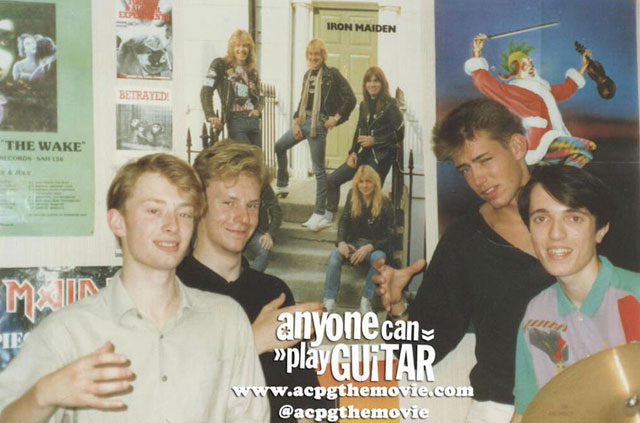I can’t stop smiling.
Locking down that boogie-woogie shuffle with the feet for four minutes ain’t no easy thing. Good job, little dude.

Quentin Tarantino turns 50 today. I’m optimistically suspecting his fifties will prove to be his prime.
If asked to pick my favorite of his scenes so far, the first thing that comes to mind is this one from Kill Bill 2. “The Bride” Beatrix has just shown up to (ahem) kill Bill, only to find him preparing a midnight snack for their young daughter. Beatrix didn’t realize her little girl was at the house, and is now forced to patiently wait for the daughter to go back to sleep before whipping out her sword and commencing with the execution. And Bill knows it.
Along with the opening scenes in Pulp Fiction, this scene’s probably my favorite example of Tarantino’s mastery of dialogue. If you’d never seen the film, and examined only the dialogue on paper, you’d have no idea what the scene was really about. But because we’re informed of Beatrix’s intentions, the otherwise bland scene becomes a thing of magic. Especially with the bonus subtext concerning life and death.
Conversely, if the dialogue simply had the characters discussing the bloody duel that was to follow once the kid went back to sleep, it would lose all its tension.
This all reminds me of how Alfred Hitchcock describes the difference between surprise and suspense, using the “bomb under the table” example:
Let’s suppose that there is a bomb underneath this table between us. Nothing happens, and then all of a sudden, “Boom!” There is an explosion. The public is surprised, but prior to this surprise, it has seen an absolutely ordinary scene, of no special consequence. Now, let us take a suspense situation. The bomb is underneath the table and the public knows it, probably because they have seen the anarchist place it there. The public is aware the bomb is going to explode at one o’clock and there is a clock in the decor. The public can see that it is a quarter to one. In these conditions, the same innocuous conversation becomes fascinating because the public is participating in the scene. The audience is longing to warn the characters on the screen: “You shouldn’t be talking about such trivial matters. There is a bomb beneath you and it is about to explode!”
In the first case we have given the public fifteen seconds of surprise at the moment of the explosion. In the second we have provided them with fifteen minutes of suspense. The conclusion is that whenever possible the public must be informed. Except when the surprise is a twist, that is, when the unexpected ending is, in itself, the highlight of the story.
The Master of Suspense, indeed.
“Always make the audience suffer as much as possible.”
— Alfred Hitchcock
PS: If you haven’t seen Django Unchained yet, do so. The dining room scene is off the hook.
From about 1986, four of the five Radiohead members back when they were called On a Friday. From left to right: (a smiling) Thom Yorke, Phil Selway, Ed O’Brien, and Colin Greenwood. I especially love the subtext behind the not one, but two Iron Maiden posters on the wall. \m/

(via internet)
Alice has released the second single off their upcoming album ‘The Devil Put Dinosaurs Here’. If you missed the first, it’s here.
Happy National Puppy Day. We started it off with this:

Then, while Pierre and I were leaving for his Bowl stroll, a cute little shorkie came running up to him on the sidewalk. A grey version of Snoogus, but with no collar. Hmmm.
NOTE: The timing couldn’t have been luckier for this lost little girl. Had I and Pierre not been there at that exact moment, she’d been a goner. She was bolting down Camrose toward busy Highland, which could only have resulted in tragedy. Or theft. It was Pierre who distracted her.
Pierre hit it off with her immediately, and played a critical role in enabling me to grab her and bring her into our enclosed yard. She was clean and groomed, and obviously not a stray. But the lack of collar and tags was weird. We gave her some food and water, played with her a bit, and started planning our next move.


Keeping her safe in the front yard, Pierre took me on a walk through the neighborhood for an hour or so, hoping to find her frantic owner. No luck. While we did take a couple photos and gave the heads-up to a couple fellow dog-strolling neighbors, Pierre suggested it was probably about time to go draft up some quick flyers. We headed back to the house.
Word of mouth goes a long way. Within about five minutes of arriving home, one of the informed neighbors came to the house with two exhausted and very relieved women from up the hill. They’d spent the past couple tortured hours searching for their little Lola after discovering the cable guy had left the door open.

A happy ending to a happy day.
Subtext can be thought of as the underlying theme in a piece of writing, or a message which is not stated directly but can be inferred. It can be difficult to execute elegantly, and when it is, it’s a thing of beauty.
Tons of subtext can be found in KRAMER VS. KRAMER, the excellent screenplay by Robert Benton. For those not familiar, this 1979 divorce drama stars Dustin Hoffman (Ted) and Meryl Streep (Joanna), and chronicles the custody battle over their six-year-old son.
In the opening minutes, the workaholic Ted is at the office, unaware that Joanna is at home preparing to walk out on him and the boy after seven years of marriage. From Page 4:
– – – – –
– – – – –
↑ That’s the juice right there. Show don’t tell.
Notice how much story is revealed in these two lines of description. We don’t even need to see the extramarital boyfriend (and we never do), yet we get still that picture.
But the real gem is the remaining perfume, and how she regards it. I’d estimate it takes a married woman about five or six years to go through a small (READ: expensive, special, not used every day) bottle of perfume, no? 😉
Awesome.
If you’re in the San Fernando Valley area of Los Angeles, the Under Angels paperbacks are available at Psychic Eye on Ventura Blvd. in Sherman Oaks / Studio City.